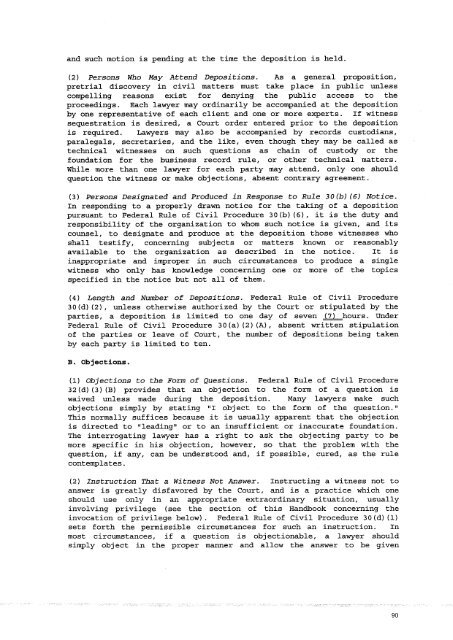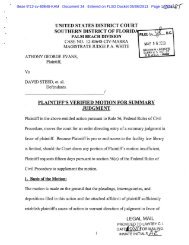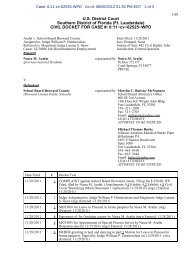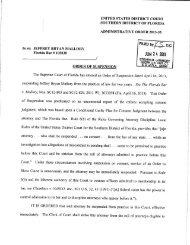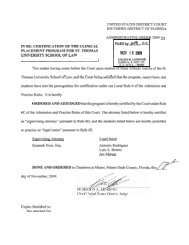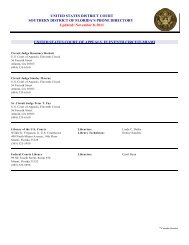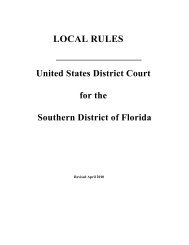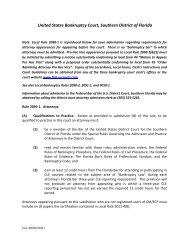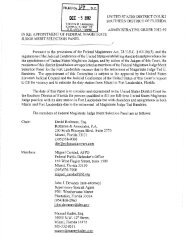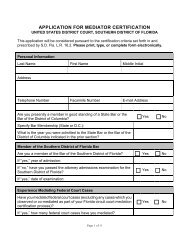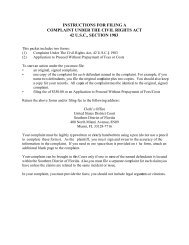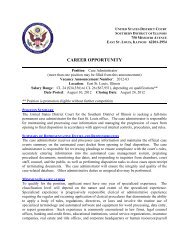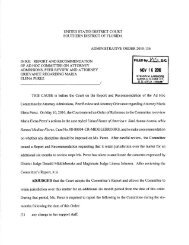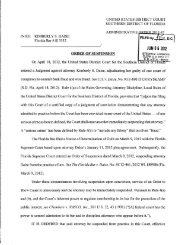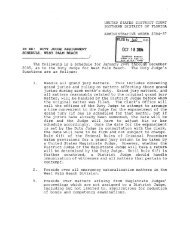JAN j 6 2010 - United States District Court
JAN j 6 2010 - United States District Court
JAN j 6 2010 - United States District Court
You also want an ePaper? Increase the reach of your titles
YUMPU automatically turns print PDFs into web optimized ePapers that Google loves.
and such motion is pending at the time the deposition is held.<br />
(2) Persons Who May Attend Depositions. As a general proposition,<br />
pretrial discovery in civil matters must take place in public unless<br />
compelling reasons exist for denying the public access to the<br />
proceedings. Each lawyer may ordinarily be accompanied at the deposition<br />
by one representative of each client and one or more experts. If witness<br />
sequestration is desired, a <strong>Court</strong> order entered prior to the deposition<br />
is required. Lawyers may also be accompanied by records custodians,<br />
paralegals, secretaries, and the like, even though they may be called as<br />
technical witnesses on such questions as chain of custody or the<br />
foundation for the business record rule, or other technical matters.<br />
While more than one lawyer for each party may attend, only one should<br />
question the witness or make objections, absent contrary agreement.<br />
(3) Persons Designated and Produced in Response to Rule 30(b)(6) Notice.<br />
In responding to a properly drawn notice for the taking of a deposition<br />
pursuant to Federal Rule of Civil Procedure 30(b)(6), it is the duty and<br />
responsibility of the organization to whom such notice is given, and its<br />
counsel, to designate and produce at the deposition those witnesses who<br />
shall testify, concerning subjects or matters known or reasonably<br />
available to the organization as described in the notice. It is<br />
inappropriate and improper in such circumstances to produce a single<br />
witness who only has knowledge concerning one or more of the topics<br />
specified in the notice but not all of them.<br />
(4) Length and Number of Depositions. Federal Rule of Civil Procedure<br />
30(d)(2), unless otherwise authorized by the <strong>Court</strong> or stipulated by the<br />
parties, a deposition is limited to one day of seven (7) hours. Under<br />
Federal Rule of Civil Procedure 30(a)(2)(A), absent written stipulation<br />
of the parties or leave of <strong>Court</strong>, the number of depositions being taken<br />
by each party is limited to ten.<br />
B. Objections.<br />
(1) Objections to the Form of Questions. Federal Rule of Civil Procedure<br />
32 (d) (3) (B) provides that an objection to the form of a question is<br />
waived unless made during the deposition. Many lawyers make such<br />
objections simply by stating "I object to the form of the question."<br />
This normally suffices because it is usually apparent that the objection<br />
is directed to "leading" or to an insufficient or inaccurate foundation.<br />
The interrogating lawyer has a right to ask the objecting party to be<br />
more specific in his objection, however, so that the problem with the<br />
question, if any, can be understood and, if possible, cured, as the rule<br />
contemplates.<br />
(2) Instruction That a Witness Not Answer. Instructing a witness not to<br />
answer is greatly disfavored by the <strong>Court</strong>, and is a practice which one<br />
should use only in an appropriate extraordinary situation, usually<br />
involving privilege (see the section of this Handbook concerning the<br />
invocation of privilege below). Federal Rule of Civil Procedure 30(d)(1)<br />
sets forth the permissible circumstances for such an instruction. In<br />
most circumstances, if a question is objectionable, a lawyer should<br />
simply object in the proper manner and allow the answer to be given<br />
90


